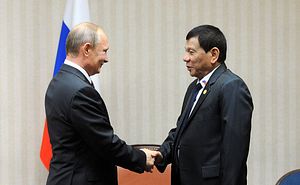During Philippine President Rodrigo Duterte’s visit to Russia last week, which was cut short by the terror attacks in Marawi, the two countries inked a total of ten deals covering everything from trade to culture to intelligence cooperation.
The trip was yet another manifestation of Duterte’s independent foreign policy, where he has sought to diversify his country’s alignments away from its traditional ally, the United States, and toward other partners with whom the Philippines has not had close ties, most notably China and Russia (See: “The Limits of Duterte’s China-US Rebalance”).
But as I have noted before, while Duterte is hardly the first Philippine leader to recognize the economic imperative of more diversified alignments, the jury was still very much out on the extent to which he could achieve cooperation in the security realm, where the challenges are much more significant (See: “The Limits of Russia-Philippines Military Relations”). In that sense, all eyes were on the much-anticipated defense deal that Manila and Moscow were expected to ink.
As I had cautioned even ahead of the visit, the scope of the defense pact was bound to be relatively limited since the two countries did not have much of a relationship in this realm previously and there remain some key limits to boosting ties (See: “A New Russia-Philippines Military Pact?”). This is despite the sensationalist headlines we have seen as well as some advances, including the two visits by Russian warships to the Philippines in January and in April this year (See: “Russian Warships in the Philippines Put Military Ties in the Spotlight”).
Sure enough, the emphasis of the agreement eventually signed a day after Duterte’s hasty departure back to the Philippines was on areas like official visits and exchanges, military port calls, and the participation of observers in military training exercises (as opposed to full-on drills) rather than more mature areas like defense industry cooperation.
The outcome reinforces the reality that this is just the beginning of the process through which the countries are exploring the opportunities for defense ties, rather than the culmination of significant collaboration already underway in fields that often make the headlines, like joint drills or arms sales. Asked last month about whether Manila and Moscow would soon hold military exercises, Duterte’s national security adviser, Hermogenes Esperon Jr., said there was still “a long way to go” before this would occur. And during the visit itself, the Philippines’ new foreign secretary, Alan Peter Cayetano, told reporters that while there were now “open doors” with respect to areas like defense equipment, Manila would first need to draw up a shopping list of what it required, after which Moscow would then study it and see where there is room for cooperation.
It is also important to keep in mind that the defense pact itself is but one manifestation of a broader military-to-military relationship that is being pursued, and that some cooperation lies outside of it, involving other realms as well as different ministries. Some of this will also be away from the limelight, such as the intelligence-sharing that the two sides will pursue following the signing of a separate agreement on the exchange of information between Philippine and Russian intelligence and law enforcement agencies to combat security challenges. With the Philippines looking to counter a series of threats ranging from drug trafficking to terrorism, it will be interesting to see if there can be some cooperation forged in this area between the two sides, which tends to be much more difficult to operationalize than the public statements often suggest.
































